Teaching is a profession for the passionate, committed and dedicated. Besides being passionate and committed, a teacher must also be aware of the qualities of a good teacher, to bring out the best in each child.
However, there are other qualities that set good teachers apart from the rest. In this blog, we will elaborate on the top 10 qualities of a good teacher and look into 30+ ways to show them.
-
Communication Skills
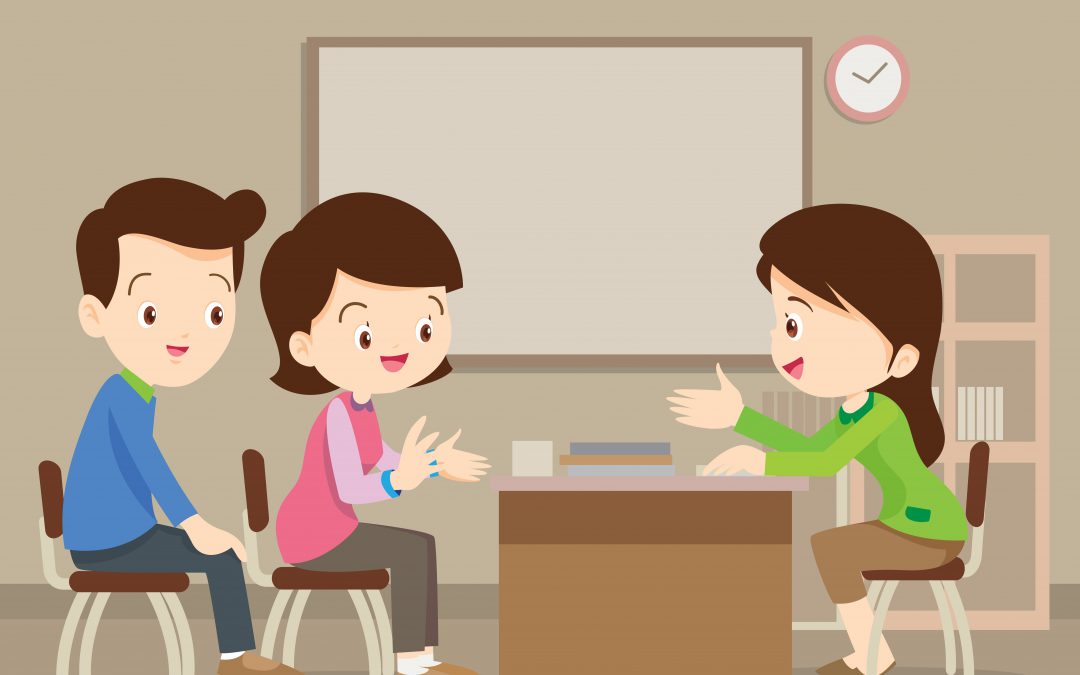
The “gift of the gab” is one of the top qualities of a good teacher. Effective communication is the key to a great learning experience. This doesn’t mean that a teacher needs to be an extrovert, rather he/she needs to effectually use verbal and non-verbal communication in their teaching methods. Teachers should be able to effectively communicate with students individually and as a group.
Fourways to Show Communication Skills
Situation 1: Parent-Teacher Meeting
You need to explain the child’s difficulties and learning problems to the parents.
In most cases, parents will be on either extreme. They would completely negate your suggestions or put the full blame on the child and label them “stupid.” In such cases, you need to use your communication skills to explain the facts without hurting either the parents or the child’s feelings.
Situation 2: Classroom
You’re teaching an abstract concept that the children are not able to grasp. This is where you need to use your communication skills to help children understand the concept.
Situation 3: Annual Day Selection
The selection for the school Annual Day is in progress and you need to convince students to participate in the drama, dance, and other events. Effectively use your communication skills to motivate and encourage students to participate, both on-stage and off-stage.
Situation 4: Explaining Homework & Assignments
Many times, students may not do an assignment or homework because they don’t understand the concept. A good teacher understands that it is important to to effectively communicate while explaining about homework and assignments. Then the students will have a better idea on how to work on the assignment.
Get FREE Teacher Apps (Check it Now)
-
Listening Skills
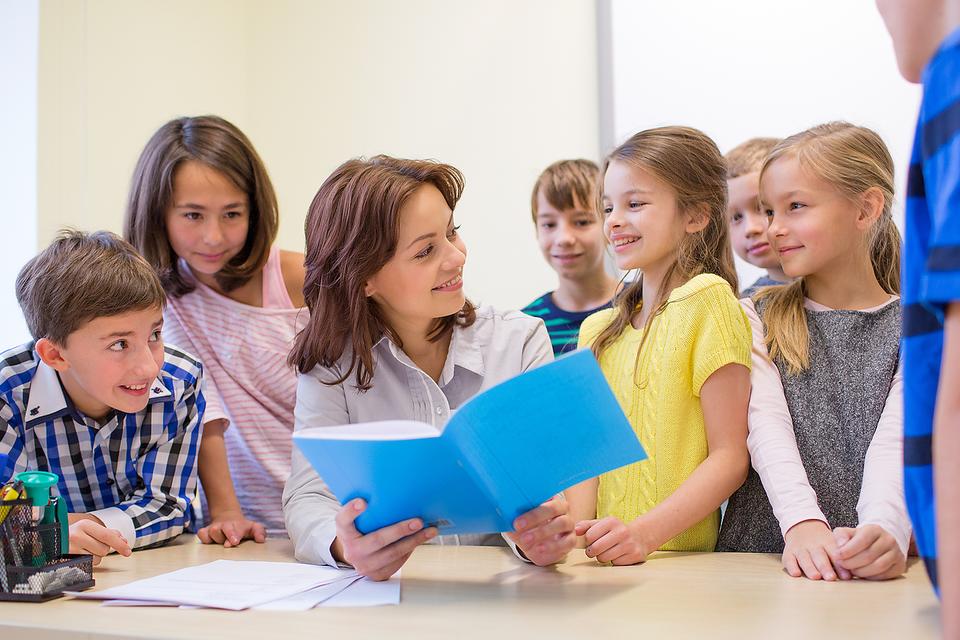
A good teacher listens more than what she/he talks about. Yes, listening skills are one of the top qualities of a good teacher. In an ideal learning environment, the teacher patiently and proactively listens to the child. If the students feel confident that their words matter, they will be happier to talk to the teacher and share their worries, thoughts, goals, and ideas.
Three Ways to Show Listening skills
Situation 5: Counselling session
You find a child sitting in the corner of the classroom and crying. Gently talk to the child and try to find out what the problem is. You need to use your listening skills here to help the child overcome his/her fear and share the problem with you.
Situation 6: Irregular Attendance
There could be many reasons why a student is taking leaves frequently. Talk to the child to find out the actual reason for irregular attendance. Listen to the real reasons and try to find a solution.
Situation 7: Class Discussion
Your listening skills will come very handy during a class discussion, more so when it is an informal discussion. Let the children talk and silently listen to what they talk about. You can find a lot about the students by listening to their informal discussions on any topic.
-
Planning & Organizing Skills

A good teacher understands the importance of planning and organization. He/she will prepare for the lesson and plan how every minute will be spent in the classroom.
Planning is also important while preparing the syllabus for each term and organizing tests and exams. Teachers with good planning and organization skills will have a better chance of scaling up the career ladder.
Three Ways to Show Your Planning & Organisational Skills
Situation 8: Preparing the Lesson Plan
The planning skills come handy while preparing the lesson plan for the coming week. In the lesson plan, the teacher notes down the chapters and concepts that will be taught during the week. The teaching aids and activities to be used for the lesson will also be included in the lesson plan. It will help teachers to have a clear idea of what they are going to do in each class.
Situation 9: Setting up a Student’s club
If you are in charge of setting up a student’s club, then you will definitely need planning and organization skills. You need to help students create a framework of the regulations and activities of the club, organize competitions and club events
Situation 10: Organising a School Trip/Annual Day
Your planning and organizational skills will be very valuable when you’re planning the school annual day, sports day, or a school trip. There are thousands of details that need to be checked before preparing the plan. Also, your collaboration skills will help you gain the support and assistance of other teachers and students in organizing the entire event.
Also Read: 16 innovative ideas to make your teaching methods more effective
-
Professionalism

Professional behavior is what sets great and best teachers apart from mediocre teachers. It is very important for good teacher to toe the fine line between being a mentor for the students and getting overfriendly with them. Professional behavior is also expected from teachers while representing the school in academic circles. The way a teacher dress behaves and deals with various situations show professional behavior.
Three Ways to Show Professionalism
Situation 11: PTA Meeting
A PTA meeting, especially with a difficult parent, is the perfect place to show your professionalism. There are times when parents may complain about the facilities or teaching style. Sometimes, they may blame you for their child’s academic performance. In such cases, good teachers deal with the situation with dignity and professionalism.
Situation 12: Fight in the Classroom
Students get into all kinds of fights and sometimes teachers need to step in to sort them out. When you’re breaking up a fight, it’s necessary to be professional and not bring in personal viewpoints.
Situation 13: Dealing with the Management
Your professional skills will be very important when you’re dealing with your higher-ups or authorities from the educational department. You may have to explain something about the school or present a report – at such times , your professionalism will set you apart from others.
-
Patience

Teaching and patience are two sides of a coin. You will need huge doses of patience to handle a large group of energetic kids. Be patient and relaxed while teaching, organizing events, handling a meeting or talking to children.
Three Ways to Show Patience
Situation 14: Listening to Student’s Excuses
It can be tiring and frustrating for a teacher to listen to a stream of excuses about why an assignment was not completed or why a student didn’t bring a textbook.
It gets annoying when students don’t respond even after so much effort on the teacher’s side. At such times, hold on to your patience and deal with the situation calmly.
Situation 15: Teaching a New concept
Another situation where your patience is very vital is when you’re teaching a new concept. All children don’t learn at the same pace. So, you need to patiently help slow learners understand the concept.
Situation 16: Organising a Program
A teacher needs to have loads of patience in addition to planning skills while organizing a program. Everybody will come up with different ideas and suggestions. Students may be interested in the initial stages and then slowly drop out. All this can make you feel like tearing your hair out. But a good teacher is patient and handles the issues calmly.
-
Creative
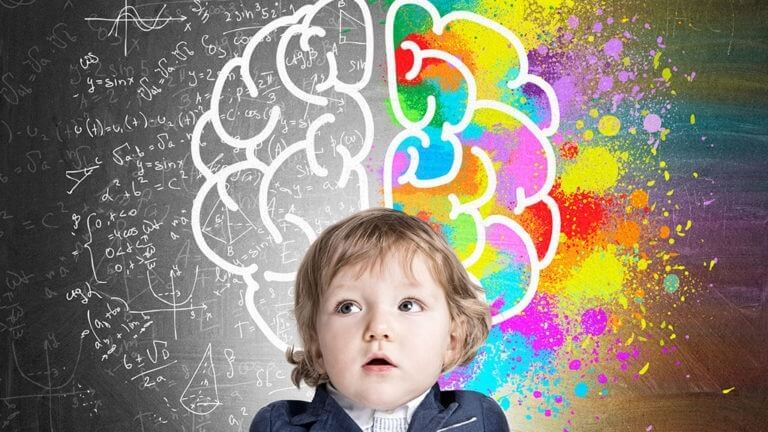
Creative and innovative thinking is one of the vital traits of a good teacher. Learning can get monotonous after some time. A creative teacher comes up with fun-filled and interesting ways to grab children’s attention and keep them focussed on lessons.
Three Ways to Show Your Creative Skills
Situation 17: Classroom Teaching
There are times when students get bored in class. Get creative during such times to make learning interesting. You can take the kids out for a walk in the playground as you discuss lessons. Or you could use creative teaching aids to pep up the students. There are many ways you can get innovative and creative in your teaching methodologies.
Situation 18: Discipline
Discipline doesn’t necessarily mean scolding or hitting a child or telling them to write imposition. Think of interesting and innovative ways to “correct” a child for forgetting the homework or doing some mischief in class. You can have creative punishments like – learn this poem and recite tomorrow; use the break hour to help KG teachers give out snacks to kids, and such.
Situation 19: Homework
Get creative while assigning homework and assignments to your students. If you’ve been teaching about the history of India, ask them to do research about their native town or village and present it to the class. Or, if you’re a science teacher, get students to collect different types of flowers or seeds.
-
Continuous Learning

A good teacher will continually update themselves about the latest developments in their field of study. Continuous learning is not just about earning certificates, but upskilling. The Corona pandemic has taken education from classrooms to online. Teachers who are willing to learn new technologies are able to keep pace with the changing demands.
Also Read: General knowledge for Kids (230 + simple gk questions and answers)
Three Ways to Show Your Continuous Learning
Situation 20: Online classroom
One place where you can showcase your continuous learning ability is in online classrooms. Your willingness to learn new technologies and adapt your teaching methodologies to the online mode will showcase your teaching ability.
Situation 21: Project Work
You need to learn and update yourself before you ask your students to work on a project. For example, you’re giving a project about climate change to your students.
The students will do individual research and come up with a lot of findings, theories, and ideas. If you don’t understand what they are talking about, you need to take time to learn about new things.
This is where you can show your students that even though you’re a teacher, you’re always willing to learn.
Situation 22: Use of technology for teaching
Smart classrooms are gaining popularity across academic institutes. Good teachers upgrade their technical skills and learn to make the most of the smart technology for teaching.
8. Flexible & Adaptable
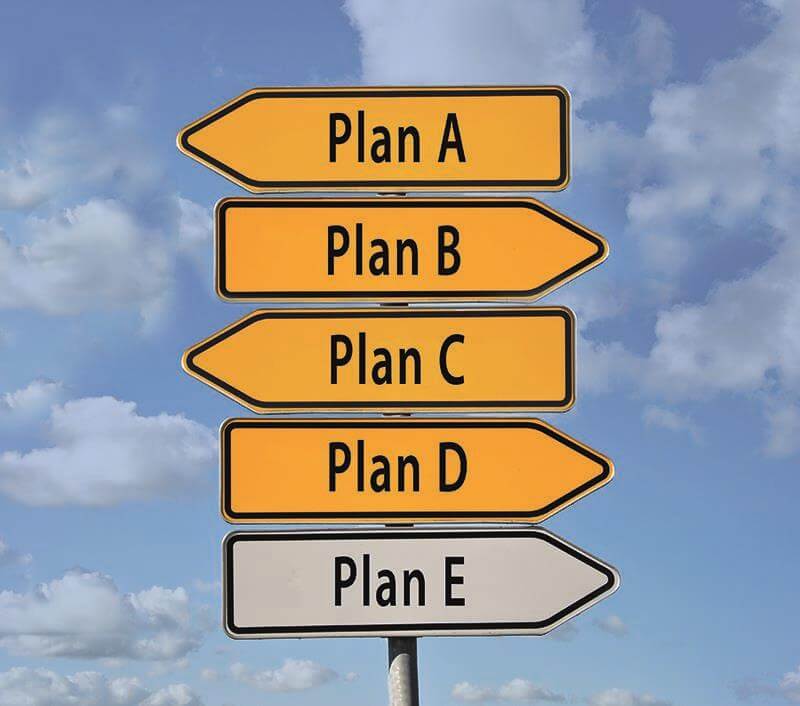
A good teacher knows to be flexible when necessary and rigid when needed. At the same time, a good teacher is able to adapt to the changing scenarios.
A good teacher handles students from different social backgrounds, economic backgrounds, and ethnicities. So, they need to have an open mind and be flexible in their approach.
Situation 23: Sudden changes in Classroom
Sometimes you may not be able to follow your lesson plan due to some situations. At such times, you need to be flexible and improvise your teaching methodology.
Situation 24: Evaluation
It is important to be fair and strict during evaluation. But sometimes, a good teacher takes a flexible approach while evaluating students. A good teacher knows that there is no one-fit-evaluation method for all students. However, the teacher also knows that being flexible with evaluation doesn’t mean showing favouritism.
Situation 25: Teaching Methodologies
A good teacher knows that it is important to be flexible with the teaching methodologies. They use a mix of teaching methodologies so that both visual learners and auditory learners are able to understand the lesson.
-
Respect

Respect is one of the prime qualities of a good teacher. A good teacher knows the mantra “Give respect to get respect.” They treat all students with respect and know that they will also be treated so.
Situation 26: Respect Personal beliefs
A school will have students from all communities, religions and backgrounds. The school rules will ensure uniform rules and regulations for all. However, there could be certain cases where a good teacher understands that personal beliefs need to be considered.
Situation 27: Respect Personal Boundaries
Good teachers know where to set personal boundaries. They are friendly and approachable. But, at the same time, they will have boundaries and will let the students know. It is very important to build a good relationship with students.
Situation 28: Respect the Regulations of School
A good teacher knows that they should respect the regulations of school. They don’t try to enforce their personal views and ideas, on students, parents or the management.
-
Great Expectations
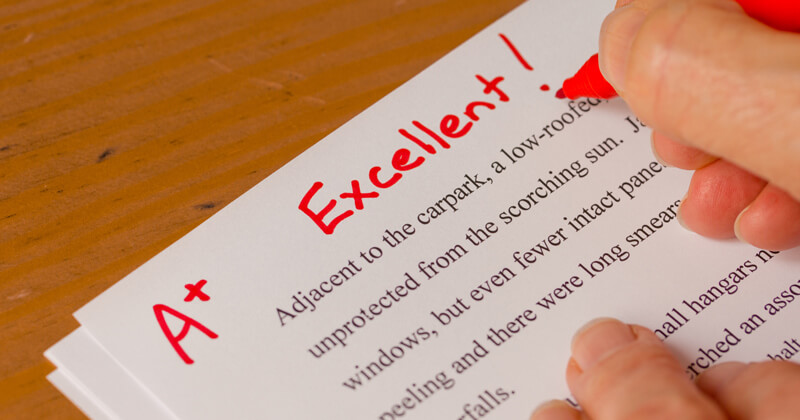
Good teachers set high expectations for students. one of the best qualities of a teacher motivates the children to live up to those expectations. In fact, many students attribute their success in life to the high expectations set by their teachers.
Three Ways to Set Great Expectations
Situation 29: Challenge Students
Good teachers continually challenge students, not just in academics, but also in extra-curricular activities. Teachers encourage and challenge students to participate in competitions and events that will help them explore their capabilities.
Situation 30: Explore New Skills
Good teachers offer plenty of opportunities for students to learn new skills. It can be done inside or outside the classroom. A good teacher identifies the innate skills and abilities of the student and helps to explore them.
Situation 31: Break Boundaries
Many students are set by various limitations, which may be because of their personal bias or peer pressure. A good teacher encourages students to break the boundaries and gain new skills and abilities.
The Qualities of a Good Teacher: Final Thoughts
Anyway, being aware of the qualities of a good teacher can help a teacher to show the best in her/him. So, I hope that the above listed top ten qualities of a good teacher have helped you to improve your way of teaching.
Do you have any other qualities to add to this list? Share them with us!
Also Check:(Our Comprehensive Researched Educational Apps Directory List)
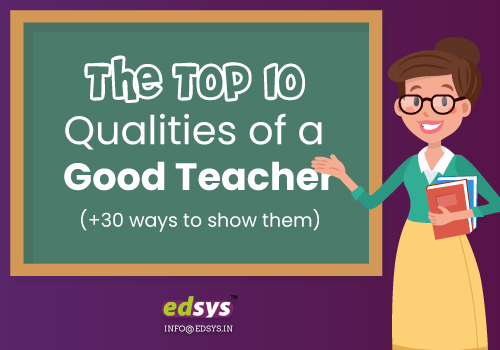


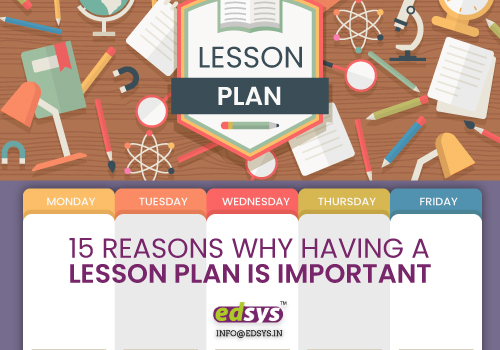



![5 Great Apps for Parent-Teacher Communication [Infographic]](https://wp.edsys.in/wp-content/uploads/2017/11/27-10-2017_5-Great-Apps-for-Parent-Teacher-Communication_featured.jpg)
